Comparative Analysis of Taxation for Ford Motors Operations
VerifiedAdded on 2020/10/22
|16
|5198
|288
Report
AI Summary
This report provides a comprehensive analysis of taxation systems, focusing on both direct and indirect taxes within the UK context. It delves into the specifics of income tax, corporation tax, and other relevant tax types, while also exploring the practical implications of taxation for businesses like Ford Motors. The report further examines the distinctions between unincorporated and incorporated organizations, highlighting their respective advantages and disadvantages, along with the ethical considerations that businesses must navigate. A comparative analysis of taxation systems across different countries, including the US and Hungary, is also presented. The report then examines the implications of ethical constraints across different cultures and concludes with an evaluation of companies requirements. The analysis also includes specific examples like the taxation of Uber drivers and the impact of tax legislation on business operations.
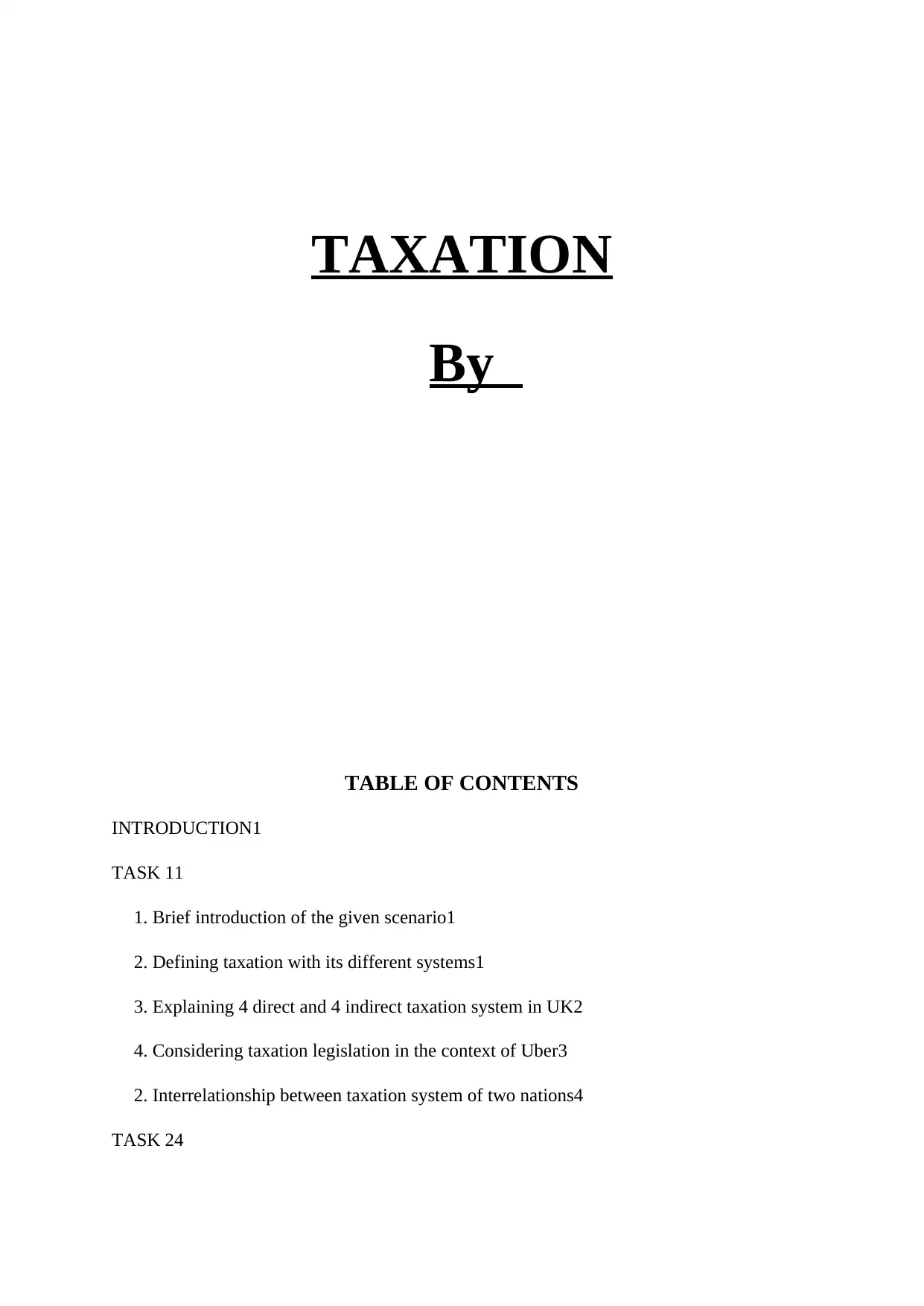
TAXATION
By
TABLE OF CONTENTS
INTRODUCTION1
TASK 11
1. Brief introduction of the given scenario1
2. Defining taxation with its different systems1
3. Explaining 4 direct and 4 indirect taxation system in UK2
4. Considering taxation legislation in the context of Uber3
2. Interrelationship between taxation system of two nations4
TASK 24
By
TABLE OF CONTENTS
INTRODUCTION1
TASK 11
1. Brief introduction of the given scenario1
2. Defining taxation with its different systems1
3. Explaining 4 direct and 4 indirect taxation system in UK2
4. Considering taxation legislation in the context of Uber3
2. Interrelationship between taxation system of two nations4
TASK 24
Paraphrase This Document
Need a fresh take? Get an instant paraphrase of this document with our AI Paraphraser
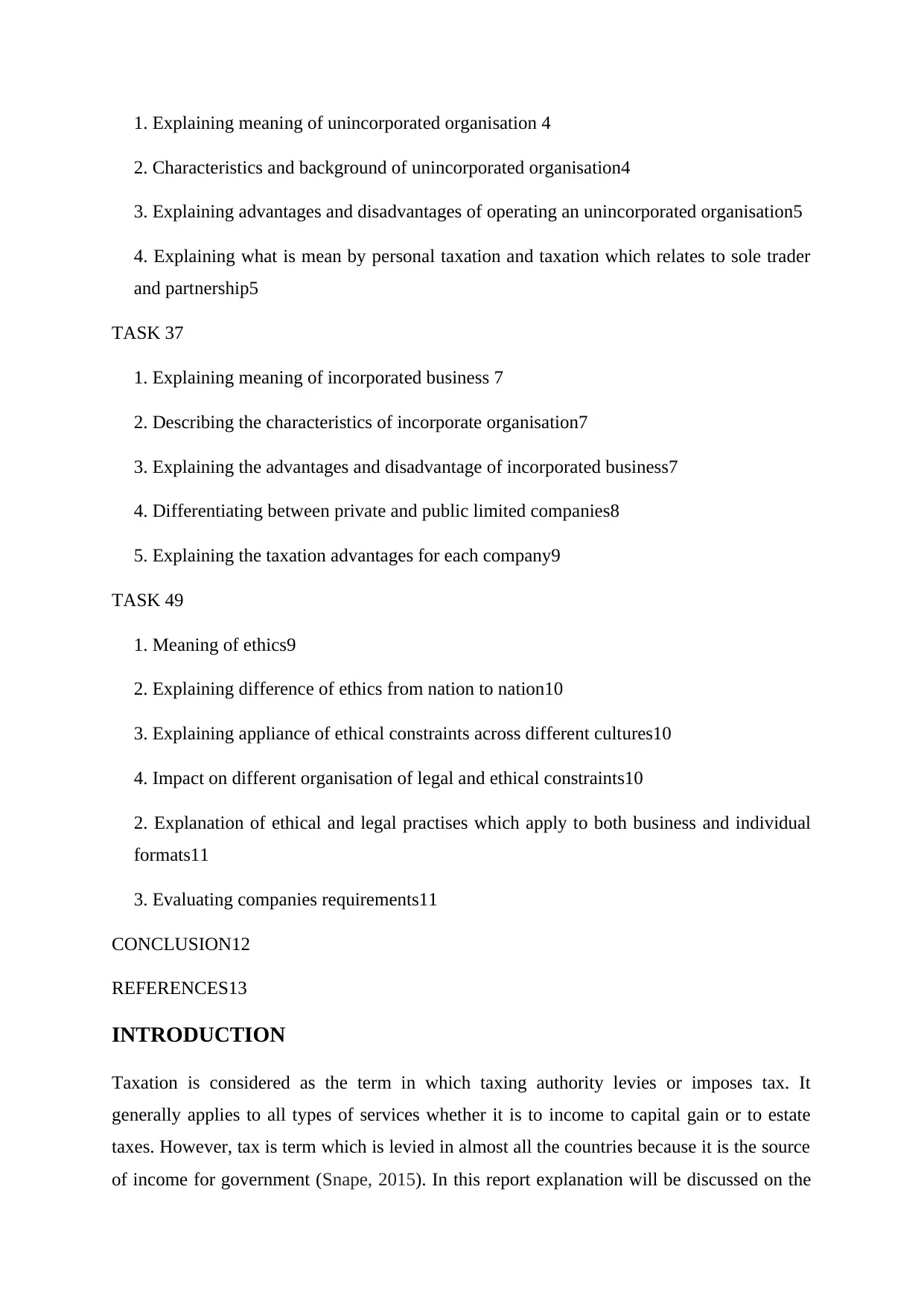
1. Explaining meaning of unincorporated organisation 4
2. Characteristics and background of unincorporated organisation4
3. Explaining advantages and disadvantages of operating an unincorporated organisation5
4. Explaining what is mean by personal taxation and taxation which relates to sole trader
and partnership5
TASK 37
1. Explaining meaning of incorporated business 7
2. Describing the characteristics of incorporate organisation7
3. Explaining the advantages and disadvantage of incorporated business7
4. Differentiating between private and public limited companies8
5. Explaining the taxation advantages for each company9
TASK 49
1. Meaning of ethics9
2. Explaining difference of ethics from nation to nation10
3. Explaining appliance of ethical constraints across different cultures10
4. Impact on different organisation of legal and ethical constraints10
2. Explanation of ethical and legal practises which apply to both business and individual
formats11
3. Evaluating companies requirements11
CONCLUSION12
REFERENCES13
INTRODUCTION
Taxation is considered as the term in which taxing authority levies or imposes tax. It
generally applies to all types of services whether it is to income to capital gain or to estate
taxes. However, tax is term which is levied in almost all the countries because it is the source
of income for government (Snape, 2015). In this report explanation will be discussed on the
2. Characteristics and background of unincorporated organisation4
3. Explaining advantages and disadvantages of operating an unincorporated organisation5
4. Explaining what is mean by personal taxation and taxation which relates to sole trader
and partnership5
TASK 37
1. Explaining meaning of incorporated business 7
2. Describing the characteristics of incorporate organisation7
3. Explaining the advantages and disadvantage of incorporated business7
4. Differentiating between private and public limited companies8
5. Explaining the taxation advantages for each company9
TASK 49
1. Meaning of ethics9
2. Explaining difference of ethics from nation to nation10
3. Explaining appliance of ethical constraints across different cultures10
4. Impact on different organisation of legal and ethical constraints10
2. Explanation of ethical and legal practises which apply to both business and individual
formats11
3. Evaluating companies requirements11
CONCLUSION12
REFERENCES13
INTRODUCTION
Taxation is considered as the term in which taxing authority levies or imposes tax. It
generally applies to all types of services whether it is to income to capital gain or to estate
taxes. However, tax is term which is levied in almost all the countries because it is the source
of income for government (Snape, 2015). In this report explanation will be discussed on the
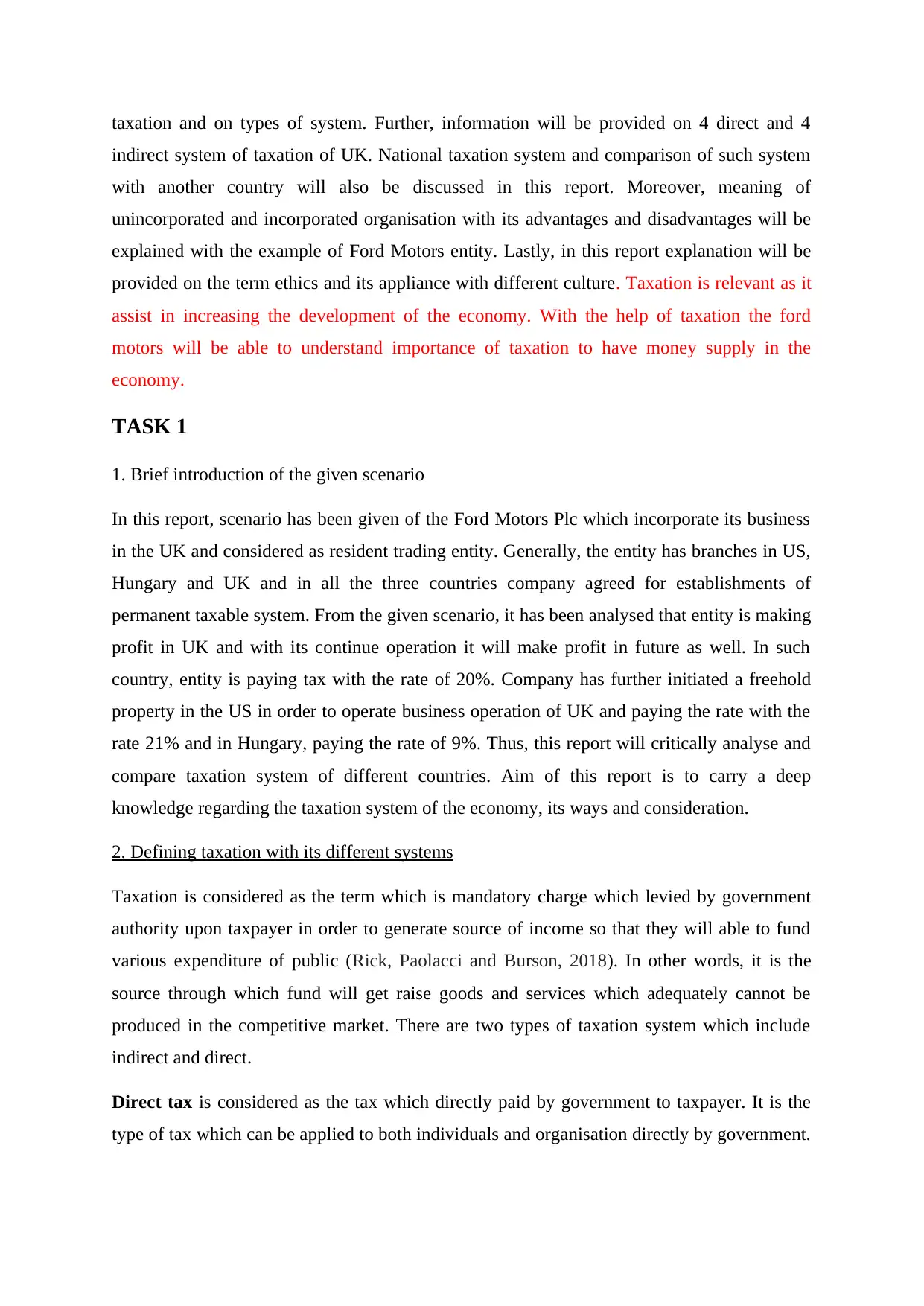
taxation and on types of system. Further, information will be provided on 4 direct and 4
indirect system of taxation of UK. National taxation system and comparison of such system
with another country will also be discussed in this report. Moreover, meaning of
unincorporated and incorporated organisation with its advantages and disadvantages will be
explained with the example of Ford Motors entity. Lastly, in this report explanation will be
provided on the term ethics and its appliance with different culture. Taxation is relevant as it
assist in increasing the development of the economy. With the help of taxation the ford
motors will be able to understand importance of taxation to have money supply in the
economy.
TASK 1
1. Brief introduction of the given scenario
In this report, scenario has been given of the Ford Motors Plc which incorporate its business
in the UK and considered as resident trading entity. Generally, the entity has branches in US,
Hungary and UK and in all the three countries company agreed for establishments of
permanent taxable system. From the given scenario, it has been analysed that entity is making
profit in UK and with its continue operation it will make profit in future as well. In such
country, entity is paying tax with the rate of 20%. Company has further initiated a freehold
property in the US in order to operate business operation of UK and paying the rate with the
rate 21% and in Hungary, paying the rate of 9%. Thus, this report will critically analyse and
compare taxation system of different countries. Aim of this report is to carry a deep
knowledge regarding the taxation system of the economy, its ways and consideration.
2. Defining taxation with its different systems
Taxation is considered as the term which is mandatory charge which levied by government
authority upon taxpayer in order to generate source of income so that they will able to fund
various expenditure of public (Rick, Paolacci and Burson, 2018). In other words, it is the
source through which fund will get raise goods and services which adequately cannot be
produced in the competitive market. There are two types of taxation system which include
indirect and direct.
Direct tax is considered as the tax which directly paid by government to taxpayer. It is the
type of tax which can be applied to both individuals and organisation directly by government.
indirect system of taxation of UK. National taxation system and comparison of such system
with another country will also be discussed in this report. Moreover, meaning of
unincorporated and incorporated organisation with its advantages and disadvantages will be
explained with the example of Ford Motors entity. Lastly, in this report explanation will be
provided on the term ethics and its appliance with different culture. Taxation is relevant as it
assist in increasing the development of the economy. With the help of taxation the ford
motors will be able to understand importance of taxation to have money supply in the
economy.
TASK 1
1. Brief introduction of the given scenario
In this report, scenario has been given of the Ford Motors Plc which incorporate its business
in the UK and considered as resident trading entity. Generally, the entity has branches in US,
Hungary and UK and in all the three countries company agreed for establishments of
permanent taxable system. From the given scenario, it has been analysed that entity is making
profit in UK and with its continue operation it will make profit in future as well. In such
country, entity is paying tax with the rate of 20%. Company has further initiated a freehold
property in the US in order to operate business operation of UK and paying the rate with the
rate 21% and in Hungary, paying the rate of 9%. Thus, this report will critically analyse and
compare taxation system of different countries. Aim of this report is to carry a deep
knowledge regarding the taxation system of the economy, its ways and consideration.
2. Defining taxation with its different systems
Taxation is considered as the term which is mandatory charge which levied by government
authority upon taxpayer in order to generate source of income so that they will able to fund
various expenditure of public (Rick, Paolacci and Burson, 2018). In other words, it is the
source through which fund will get raise goods and services which adequately cannot be
produced in the competitive market. There are two types of taxation system which include
indirect and direct.
Direct tax is considered as the tax which directly paid by government to taxpayer. It is the
type of tax which can be applied to both individuals and organisation directly by government.
⊘ This is a preview!⊘
Do you want full access?
Subscribe today to unlock all pages.

Trusted by 1+ million students worldwide
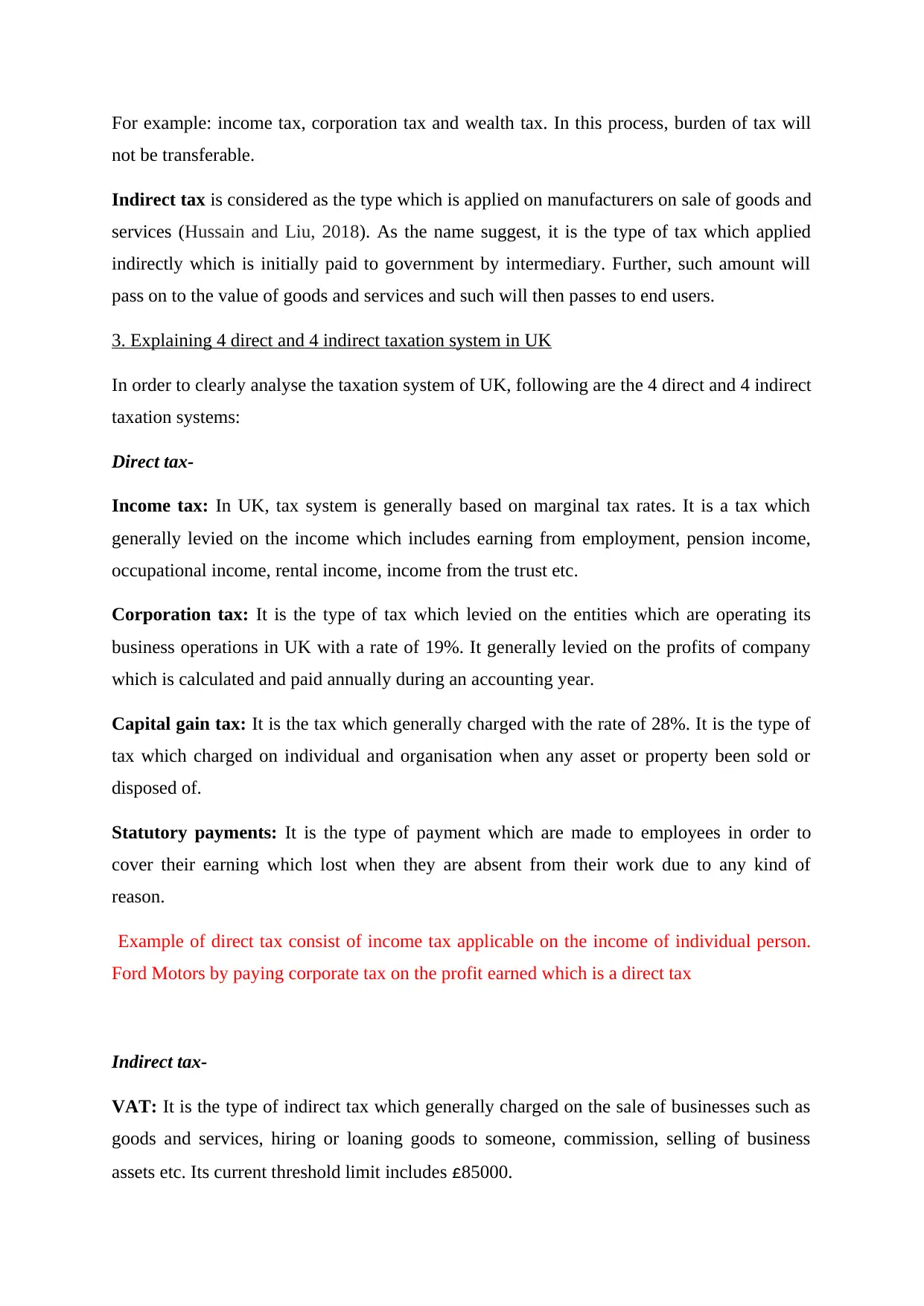
For example: income tax, corporation tax and wealth tax. In this process, burden of tax will
not be transferable.
Indirect tax is considered as the type which is applied on manufacturers on sale of goods and
services (Hussain and Liu, 2018). As the name suggest, it is the type of tax which applied
indirectly which is initially paid to government by intermediary. Further, such amount will
pass on to the value of goods and services and such will then passes to end users.
3. Explaining 4 direct and 4 indirect taxation system in UK
In order to clearly analyse the taxation system of UK, following are the 4 direct and 4 indirect
taxation systems:
Direct tax-
Income tax: In UK, tax system is generally based on marginal tax rates. It is a tax which
generally levied on the income which includes earning from employment, pension income,
occupational income, rental income, income from the trust etc.
Corporation tax: It is the type of tax which levied on the entities which are operating its
business operations in UK with a rate of 19%. It generally levied on the profits of company
which is calculated and paid annually during an accounting year.
Capital gain tax: It is the tax which generally charged with the rate of 28%. It is the type of
tax which charged on individual and organisation when any asset or property been sold or
disposed of.
Statutory payments: It is the type of payment which are made to employees in order to
cover their earning which lost when they are absent from their work due to any kind of
reason.
Example of direct tax consist of income tax applicable on the income of individual person.
Ford Motors by paying corporate tax on the profit earned which is a direct tax
Indirect tax-
VAT: It is the type of indirect tax which generally charged on the sale of businesses such as
goods and services, hiring or loaning goods to someone, commission, selling of business
assets etc. Its current threshold limit includes £85000.
not be transferable.
Indirect tax is considered as the type which is applied on manufacturers on sale of goods and
services (Hussain and Liu, 2018). As the name suggest, it is the type of tax which applied
indirectly which is initially paid to government by intermediary. Further, such amount will
pass on to the value of goods and services and such will then passes to end users.
3. Explaining 4 direct and 4 indirect taxation system in UK
In order to clearly analyse the taxation system of UK, following are the 4 direct and 4 indirect
taxation systems:
Direct tax-
Income tax: In UK, tax system is generally based on marginal tax rates. It is a tax which
generally levied on the income which includes earning from employment, pension income,
occupational income, rental income, income from the trust etc.
Corporation tax: It is the type of tax which levied on the entities which are operating its
business operations in UK with a rate of 19%. It generally levied on the profits of company
which is calculated and paid annually during an accounting year.
Capital gain tax: It is the tax which generally charged with the rate of 28%. It is the type of
tax which charged on individual and organisation when any asset or property been sold or
disposed of.
Statutory payments: It is the type of payment which are made to employees in order to
cover their earning which lost when they are absent from their work due to any kind of
reason.
Example of direct tax consist of income tax applicable on the income of individual person.
Ford Motors by paying corporate tax on the profit earned which is a direct tax
Indirect tax-
VAT: It is the type of indirect tax which generally charged on the sale of businesses such as
goods and services, hiring or loaning goods to someone, commission, selling of business
assets etc. Its current threshold limit includes £85000.
Paraphrase This Document
Need a fresh take? Get an instant paraphrase of this document with our AI Paraphraser
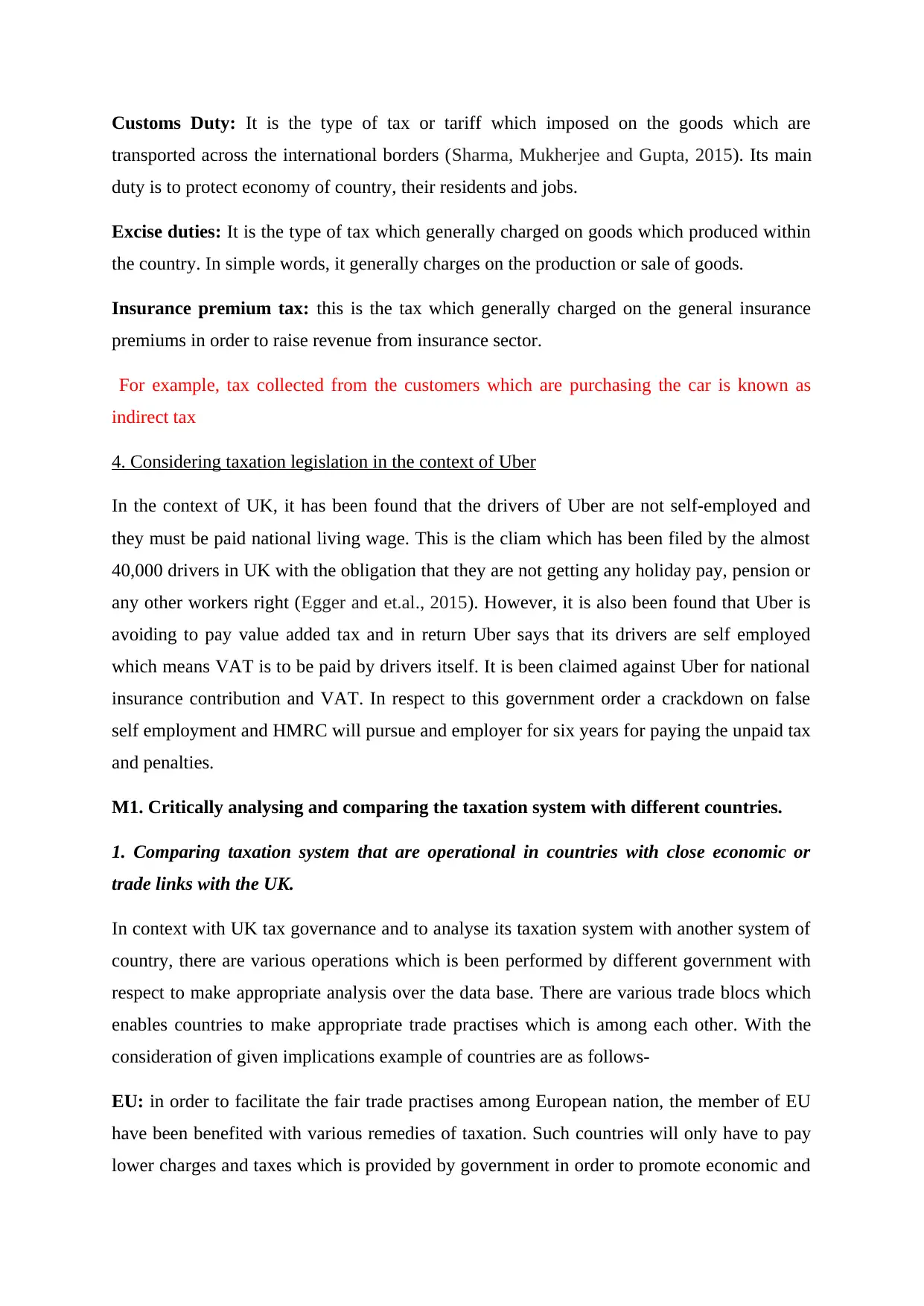
Customs Duty: It is the type of tax or tariff which imposed on the goods which are
transported across the international borders (Sharma, Mukherjee and Gupta, 2015). Its main
duty is to protect economy of country, their residents and jobs.
Excise duties: It is the type of tax which generally charged on goods which produced within
the country. In simple words, it generally charges on the production or sale of goods.
Insurance premium tax: this is the tax which generally charged on the general insurance
premiums in order to raise revenue from insurance sector.
For example, tax collected from the customers which are purchasing the car is known as
indirect tax
4. Considering taxation legislation in the context of Uber
In the context of UK, it has been found that the drivers of Uber are not self-employed and
they must be paid national living wage. This is the cliam which has been filed by the almost
40,000 drivers in UK with the obligation that they are not getting any holiday pay, pension or
any other workers right (Egger and et.al., 2015). However, it is also been found that Uber is
avoiding to pay value added tax and in return Uber says that its drivers are self employed
which means VAT is to be paid by drivers itself. It is been claimed against Uber for national
insurance contribution and VAT. In respect to this government order a crackdown on false
self employment and HMRC will pursue and employer for six years for paying the unpaid tax
and penalties.
M1. Critically analysing and comparing the taxation system with different countries.
1. Comparing taxation system that are operational in countries with close economic or
trade links with the UK.
In context with UK tax governance and to analyse its taxation system with another system of
country, there are various operations which is been performed by different government with
respect to make appropriate analysis over the data base. There are various trade blocs which
enables countries to make appropriate trade practises which is among each other. With the
consideration of given implications example of countries are as follows-
EU: in order to facilitate the fair trade practises among European nation, the member of EU
have been benefited with various remedies of taxation. Such countries will only have to pay
lower charges and taxes which is provided by government in order to promote economic and
transported across the international borders (Sharma, Mukherjee and Gupta, 2015). Its main
duty is to protect economy of country, their residents and jobs.
Excise duties: It is the type of tax which generally charged on goods which produced within
the country. In simple words, it generally charges on the production or sale of goods.
Insurance premium tax: this is the tax which generally charged on the general insurance
premiums in order to raise revenue from insurance sector.
For example, tax collected from the customers which are purchasing the car is known as
indirect tax
4. Considering taxation legislation in the context of Uber
In the context of UK, it has been found that the drivers of Uber are not self-employed and
they must be paid national living wage. This is the cliam which has been filed by the almost
40,000 drivers in UK with the obligation that they are not getting any holiday pay, pension or
any other workers right (Egger and et.al., 2015). However, it is also been found that Uber is
avoiding to pay value added tax and in return Uber says that its drivers are self employed
which means VAT is to be paid by drivers itself. It is been claimed against Uber for national
insurance contribution and VAT. In respect to this government order a crackdown on false
self employment and HMRC will pursue and employer for six years for paying the unpaid tax
and penalties.
M1. Critically analysing and comparing the taxation system with different countries.
1. Comparing taxation system that are operational in countries with close economic or
trade links with the UK.
In context with UK tax governance and to analyse its taxation system with another system of
country, there are various operations which is been performed by different government with
respect to make appropriate analysis over the data base. There are various trade blocs which
enables countries to make appropriate trade practises which is among each other. With the
consideration of given implications example of countries are as follows-
EU: in order to facilitate the fair trade practises among European nation, the member of EU
have been benefited with various remedies of taxation. Such countries will only have to pay
lower charges and taxes which is provided by government in order to promote economic and
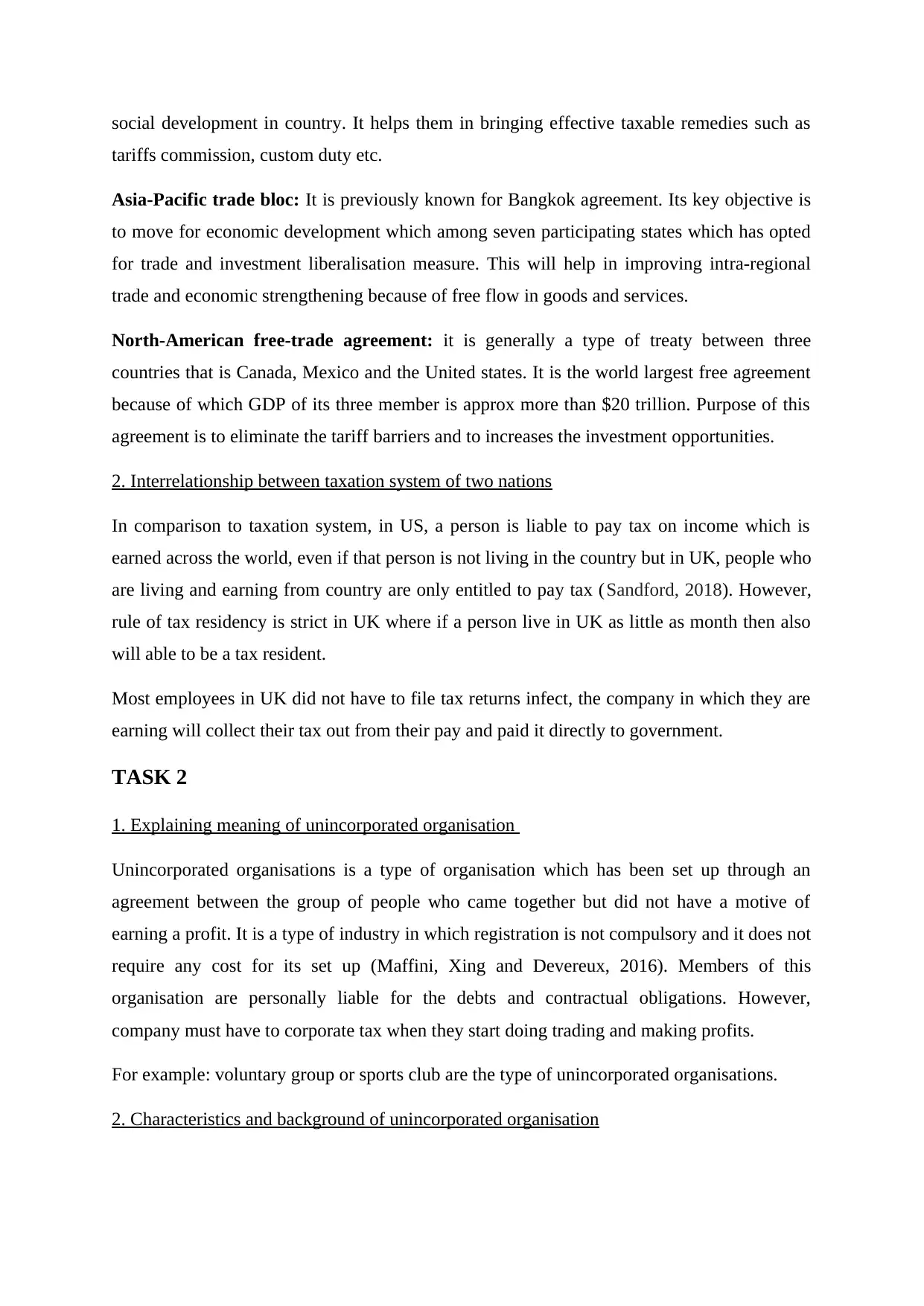
social development in country. It helps them in bringing effective taxable remedies such as
tariffs commission, custom duty etc.
Asia-Pacific trade bloc: It is previously known for Bangkok agreement. Its key objective is
to move for economic development which among seven participating states which has opted
for trade and investment liberalisation measure. This will help in improving intra-regional
trade and economic strengthening because of free flow in goods and services.
North-American free-trade agreement: it is generally a type of treaty between three
countries that is Canada, Mexico and the United states. It is the world largest free agreement
because of which GDP of its three member is approx more than $20 trillion. Purpose of this
agreement is to eliminate the tariff barriers and to increases the investment opportunities.
2. Interrelationship between taxation system of two nations
In comparison to taxation system, in US, a person is liable to pay tax on income which is
earned across the world, even if that person is not living in the country but in UK, people who
are living and earning from country are only entitled to pay tax (Sandford, 2018). However,
rule of tax residency is strict in UK where if a person live in UK as little as month then also
will able to be a tax resident.
Most employees in UK did not have to file tax returns infect, the company in which they are
earning will collect their tax out from their pay and paid it directly to government.
TASK 2
1. Explaining meaning of unincorporated organisation
Unincorporated organisations is a type of organisation which has been set up through an
agreement between the group of people who came together but did not have a motive of
earning a profit. It is a type of industry in which registration is not compulsory and it does not
require any cost for its set up (Maffini, Xing and Devereux, 2016). Members of this
organisation are personally liable for the debts and contractual obligations. However,
company must have to corporate tax when they start doing trading and making profits.
For example: voluntary group or sports club are the type of unincorporated organisations.
2. Characteristics and background of unincorporated organisation
tariffs commission, custom duty etc.
Asia-Pacific trade bloc: It is previously known for Bangkok agreement. Its key objective is
to move for economic development which among seven participating states which has opted
for trade and investment liberalisation measure. This will help in improving intra-regional
trade and economic strengthening because of free flow in goods and services.
North-American free-trade agreement: it is generally a type of treaty between three
countries that is Canada, Mexico and the United states. It is the world largest free agreement
because of which GDP of its three member is approx more than $20 trillion. Purpose of this
agreement is to eliminate the tariff barriers and to increases the investment opportunities.
2. Interrelationship between taxation system of two nations
In comparison to taxation system, in US, a person is liable to pay tax on income which is
earned across the world, even if that person is not living in the country but in UK, people who
are living and earning from country are only entitled to pay tax (Sandford, 2018). However,
rule of tax residency is strict in UK where if a person live in UK as little as month then also
will able to be a tax resident.
Most employees in UK did not have to file tax returns infect, the company in which they are
earning will collect their tax out from their pay and paid it directly to government.
TASK 2
1. Explaining meaning of unincorporated organisation
Unincorporated organisations is a type of organisation which has been set up through an
agreement between the group of people who came together but did not have a motive of
earning a profit. It is a type of industry in which registration is not compulsory and it does not
require any cost for its set up (Maffini, Xing and Devereux, 2016). Members of this
organisation are personally liable for the debts and contractual obligations. However,
company must have to corporate tax when they start doing trading and making profits.
For example: voluntary group or sports club are the type of unincorporated organisations.
2. Characteristics and background of unincorporated organisation
⊘ This is a preview!⊘
Do you want full access?
Subscribe today to unlock all pages.

Trusted by 1+ million students worldwide
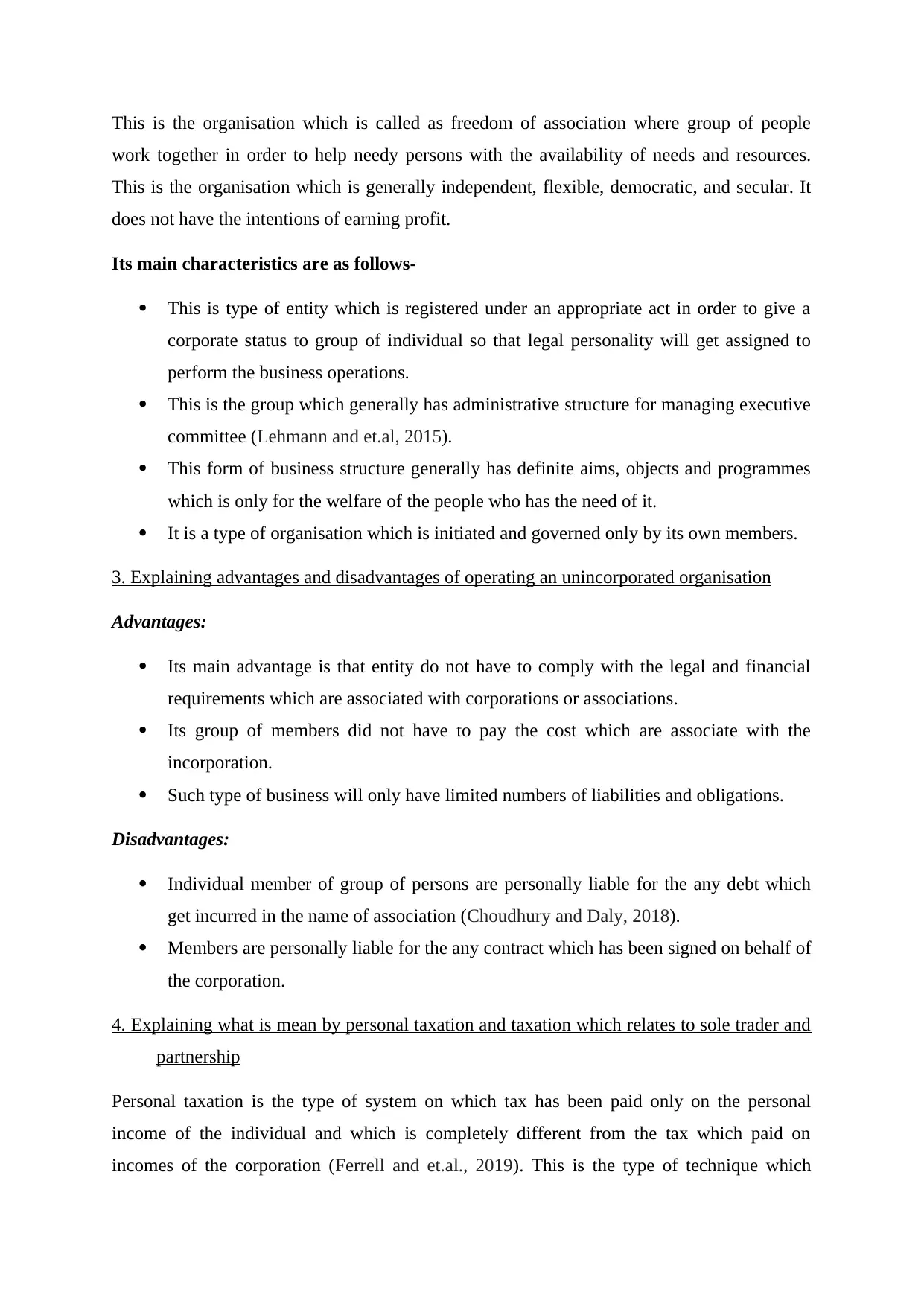
This is the organisation which is called as freedom of association where group of people
work together in order to help needy persons with the availability of needs and resources.
This is the organisation which is generally independent, flexible, democratic, and secular. It
does not have the intentions of earning profit.
Its main characteristics are as follows-
This is type of entity which is registered under an appropriate act in order to give a
corporate status to group of individual so that legal personality will get assigned to
perform the business operations.
This is the group which generally has administrative structure for managing executive
committee (Lehmann and et.al, 2015).
This form of business structure generally has definite aims, objects and programmes
which is only for the welfare of the people who has the need of it.
It is a type of organisation which is initiated and governed only by its own members.
3. Explaining advantages and disadvantages of operating an unincorporated organisation
Advantages:
Its main advantage is that entity do not have to comply with the legal and financial
requirements which are associated with corporations or associations.
Its group of members did not have to pay the cost which are associate with the
incorporation.
Such type of business will only have limited numbers of liabilities and obligations.
Disadvantages:
Individual member of group of persons are personally liable for the any debt which
get incurred in the name of association (Choudhury and Daly, 2018).
Members are personally liable for the any contract which has been signed on behalf of
the corporation.
4. Explaining what is mean by personal taxation and taxation which relates to sole trader and
partnership
Personal taxation is the type of system on which tax has been paid only on the personal
income of the individual and which is completely different from the tax which paid on
incomes of the corporation (Ferrell and et.al., 2019). This is the type of technique which
work together in order to help needy persons with the availability of needs and resources.
This is the organisation which is generally independent, flexible, democratic, and secular. It
does not have the intentions of earning profit.
Its main characteristics are as follows-
This is type of entity which is registered under an appropriate act in order to give a
corporate status to group of individual so that legal personality will get assigned to
perform the business operations.
This is the group which generally has administrative structure for managing executive
committee (Lehmann and et.al, 2015).
This form of business structure generally has definite aims, objects and programmes
which is only for the welfare of the people who has the need of it.
It is a type of organisation which is initiated and governed only by its own members.
3. Explaining advantages and disadvantages of operating an unincorporated organisation
Advantages:
Its main advantage is that entity do not have to comply with the legal and financial
requirements which are associated with corporations or associations.
Its group of members did not have to pay the cost which are associate with the
incorporation.
Such type of business will only have limited numbers of liabilities and obligations.
Disadvantages:
Individual member of group of persons are personally liable for the any debt which
get incurred in the name of association (Choudhury and Daly, 2018).
Members are personally liable for the any contract which has been signed on behalf of
the corporation.
4. Explaining what is mean by personal taxation and taxation which relates to sole trader and
partnership
Personal taxation is the type of system on which tax has been paid only on the personal
income of the individual and which is completely different from the tax which paid on
incomes of the corporation (Ferrell and et.al., 2019). This is the type of technique which
Paraphrase This Document
Need a fresh take? Get an instant paraphrase of this document with our AI Paraphraser
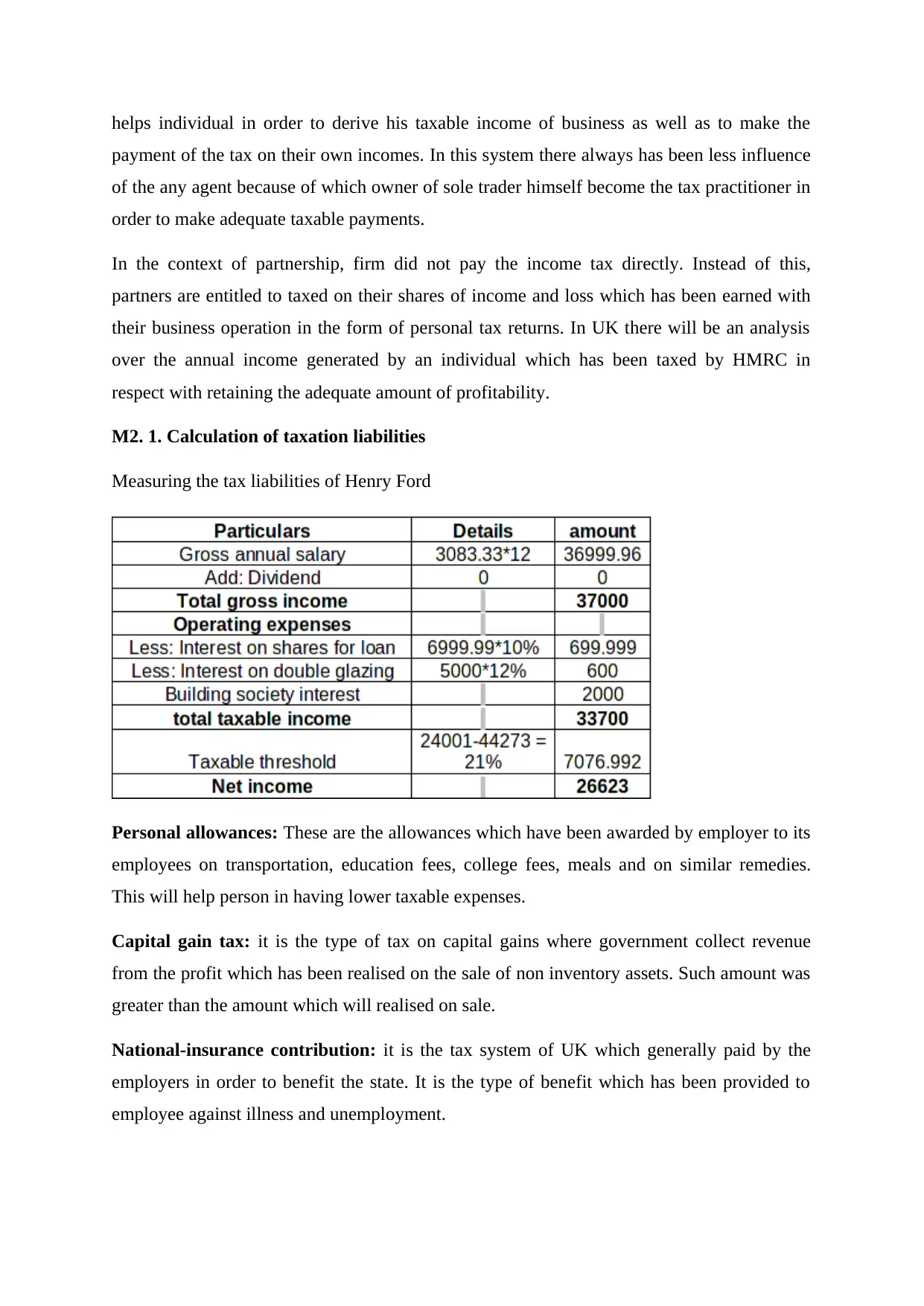
helps individual in order to derive his taxable income of business as well as to make the
payment of the tax on their own incomes. In this system there always has been less influence
of the any agent because of which owner of sole trader himself become the tax practitioner in
order to make adequate taxable payments.
In the context of partnership, firm did not pay the income tax directly. Instead of this,
partners are entitled to taxed on their shares of income and loss which has been earned with
their business operation in the form of personal tax returns. In UK there will be an analysis
over the annual income generated by an individual which has been taxed by HMRC in
respect with retaining the adequate amount of profitability.
M2. 1. Calculation of taxation liabilities
Measuring the tax liabilities of Henry Ford
Personal allowances: These are the allowances which have been awarded by employer to its
employees on transportation, education fees, college fees, meals and on similar remedies.
This will help person in having lower taxable expenses.
Capital gain tax: it is the type of tax on capital gains where government collect revenue
from the profit which has been realised on the sale of non inventory assets. Such amount was
greater than the amount which will realised on sale.
National-insurance contribution: it is the tax system of UK which generally paid by the
employers in order to benefit the state. It is the type of benefit which has been provided to
employee against illness and unemployment.
payment of the tax on their own incomes. In this system there always has been less influence
of the any agent because of which owner of sole trader himself become the tax practitioner in
order to make adequate taxable payments.
In the context of partnership, firm did not pay the income tax directly. Instead of this,
partners are entitled to taxed on their shares of income and loss which has been earned with
their business operation in the form of personal tax returns. In UK there will be an analysis
over the annual income generated by an individual which has been taxed by HMRC in
respect with retaining the adequate amount of profitability.
M2. 1. Calculation of taxation liabilities
Measuring the tax liabilities of Henry Ford
Personal allowances: These are the allowances which have been awarded by employer to its
employees on transportation, education fees, college fees, meals and on similar remedies.
This will help person in having lower taxable expenses.
Capital gain tax: it is the type of tax on capital gains where government collect revenue
from the profit which has been realised on the sale of non inventory assets. Such amount was
greater than the amount which will realised on sale.
National-insurance contribution: it is the tax system of UK which generally paid by the
employers in order to benefit the state. It is the type of benefit which has been provided to
employee against illness and unemployment.
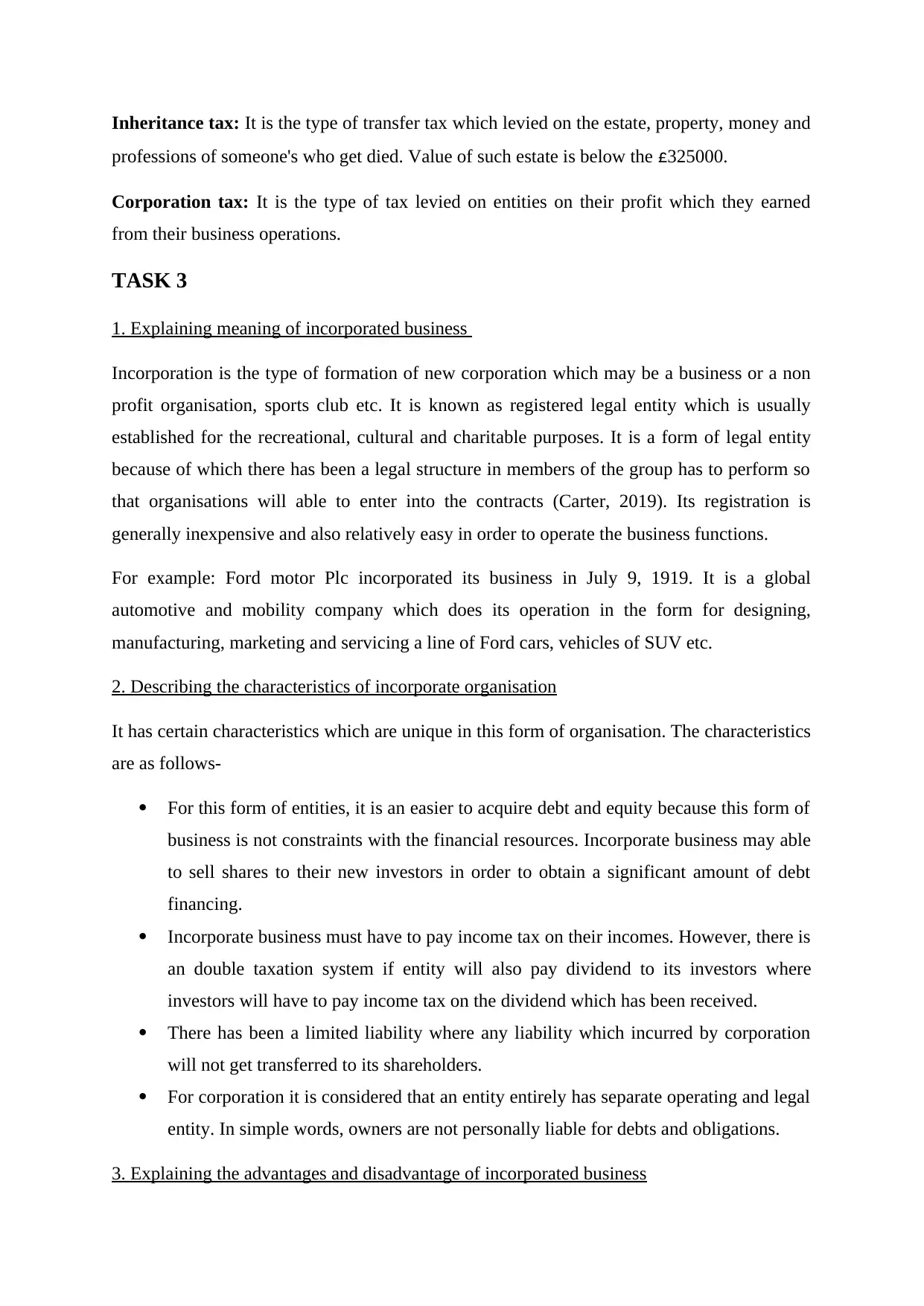
Inheritance tax: It is the type of transfer tax which levied on the estate, property, money and
professions of someone's who get died. Value of such estate is below the £325000.
Corporation tax: It is the type of tax levied on entities on their profit which they earned
from their business operations.
TASK 3
1. Explaining meaning of incorporated business
Incorporation is the type of formation of new corporation which may be a business or a non
profit organisation, sports club etc. It is known as registered legal entity which is usually
established for the recreational, cultural and charitable purposes. It is a form of legal entity
because of which there has been a legal structure in members of the group has to perform so
that organisations will able to enter into the contracts (Carter, 2019). Its registration is
generally inexpensive and also relatively easy in order to operate the business functions.
For example: Ford motor Plc incorporated its business in July 9, 1919. It is a global
automotive and mobility company which does its operation in the form for designing,
manufacturing, marketing and servicing a line of Ford cars, vehicles of SUV etc.
2. Describing the characteristics of incorporate organisation
It has certain characteristics which are unique in this form of organisation. The characteristics
are as follows-
For this form of entities, it is an easier to acquire debt and equity because this form of
business is not constraints with the financial resources. Incorporate business may able
to sell shares to their new investors in order to obtain a significant amount of debt
financing.
Incorporate business must have to pay income tax on their incomes. However, there is
an double taxation system if entity will also pay dividend to its investors where
investors will have to pay income tax on the dividend which has been received.
There has been a limited liability where any liability which incurred by corporation
will not get transferred to its shareholders.
For corporation it is considered that an entity entirely has separate operating and legal
entity. In simple words, owners are not personally liable for debts and obligations.
3. Explaining the advantages and disadvantage of incorporated business
professions of someone's who get died. Value of such estate is below the £325000.
Corporation tax: It is the type of tax levied on entities on their profit which they earned
from their business operations.
TASK 3
1. Explaining meaning of incorporated business
Incorporation is the type of formation of new corporation which may be a business or a non
profit organisation, sports club etc. It is known as registered legal entity which is usually
established for the recreational, cultural and charitable purposes. It is a form of legal entity
because of which there has been a legal structure in members of the group has to perform so
that organisations will able to enter into the contracts (Carter, 2019). Its registration is
generally inexpensive and also relatively easy in order to operate the business functions.
For example: Ford motor Plc incorporated its business in July 9, 1919. It is a global
automotive and mobility company which does its operation in the form for designing,
manufacturing, marketing and servicing a line of Ford cars, vehicles of SUV etc.
2. Describing the characteristics of incorporate organisation
It has certain characteristics which are unique in this form of organisation. The characteristics
are as follows-
For this form of entities, it is an easier to acquire debt and equity because this form of
business is not constraints with the financial resources. Incorporate business may able
to sell shares to their new investors in order to obtain a significant amount of debt
financing.
Incorporate business must have to pay income tax on their incomes. However, there is
an double taxation system if entity will also pay dividend to its investors where
investors will have to pay income tax on the dividend which has been received.
There has been a limited liability where any liability which incurred by corporation
will not get transferred to its shareholders.
For corporation it is considered that an entity entirely has separate operating and legal
entity. In simple words, owners are not personally liable for debts and obligations.
3. Explaining the advantages and disadvantage of incorporated business
⊘ This is a preview!⊘
Do you want full access?
Subscribe today to unlock all pages.

Trusted by 1+ million students worldwide
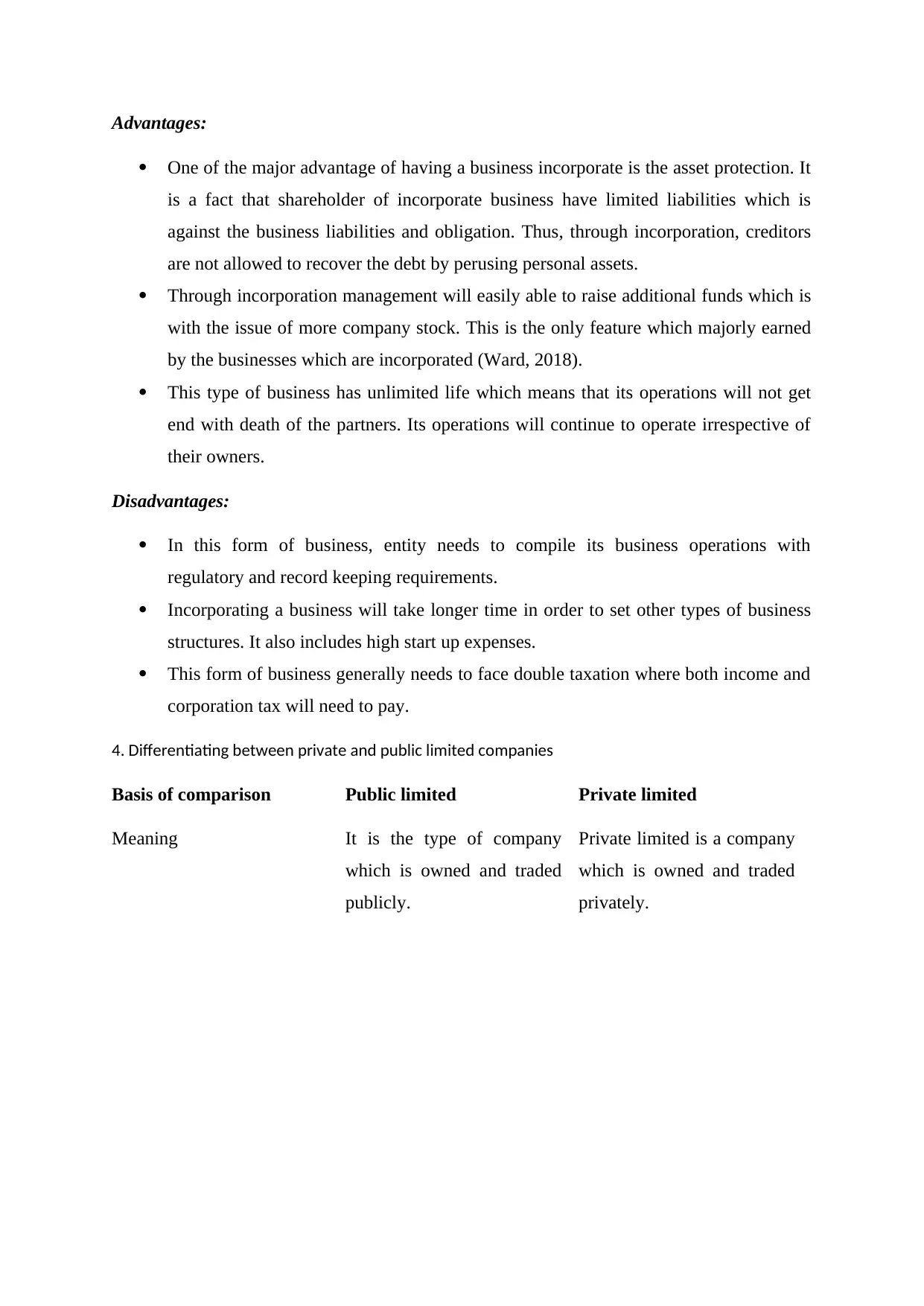
Advantages:
One of the major advantage of having a business incorporate is the asset protection. It
is a fact that shareholder of incorporate business have limited liabilities which is
against the business liabilities and obligation. Thus, through incorporation, creditors
are not allowed to recover the debt by perusing personal assets.
Through incorporation management will easily able to raise additional funds which is
with the issue of more company stock. This is the only feature which majorly earned
by the businesses which are incorporated (Ward, 2018).
This type of business has unlimited life which means that its operations will not get
end with death of the partners. Its operations will continue to operate irrespective of
their owners.
Disadvantages:
In this form of business, entity needs to compile its business operations with
regulatory and record keeping requirements.
Incorporating a business will take longer time in order to set other types of business
structures. It also includes high start up expenses.
This form of business generally needs to face double taxation where both income and
corporation tax will need to pay.
4. Differentiating between private and public limited companies
Basis of comparison Public limited Private limited
Meaning It is the type of company
which is owned and traded
publicly.
Private limited is a company
which is owned and traded
privately.
One of the major advantage of having a business incorporate is the asset protection. It
is a fact that shareholder of incorporate business have limited liabilities which is
against the business liabilities and obligation. Thus, through incorporation, creditors
are not allowed to recover the debt by perusing personal assets.
Through incorporation management will easily able to raise additional funds which is
with the issue of more company stock. This is the only feature which majorly earned
by the businesses which are incorporated (Ward, 2018).
This type of business has unlimited life which means that its operations will not get
end with death of the partners. Its operations will continue to operate irrespective of
their owners.
Disadvantages:
In this form of business, entity needs to compile its business operations with
regulatory and record keeping requirements.
Incorporating a business will take longer time in order to set other types of business
structures. It also includes high start up expenses.
This form of business generally needs to face double taxation where both income and
corporation tax will need to pay.
4. Differentiating between private and public limited companies
Basis of comparison Public limited Private limited
Meaning It is the type of company
which is owned and traded
publicly.
Private limited is a company
which is owned and traded
privately.
Paraphrase This Document
Need a fresh take? Get an instant paraphrase of this document with our AI Paraphraser
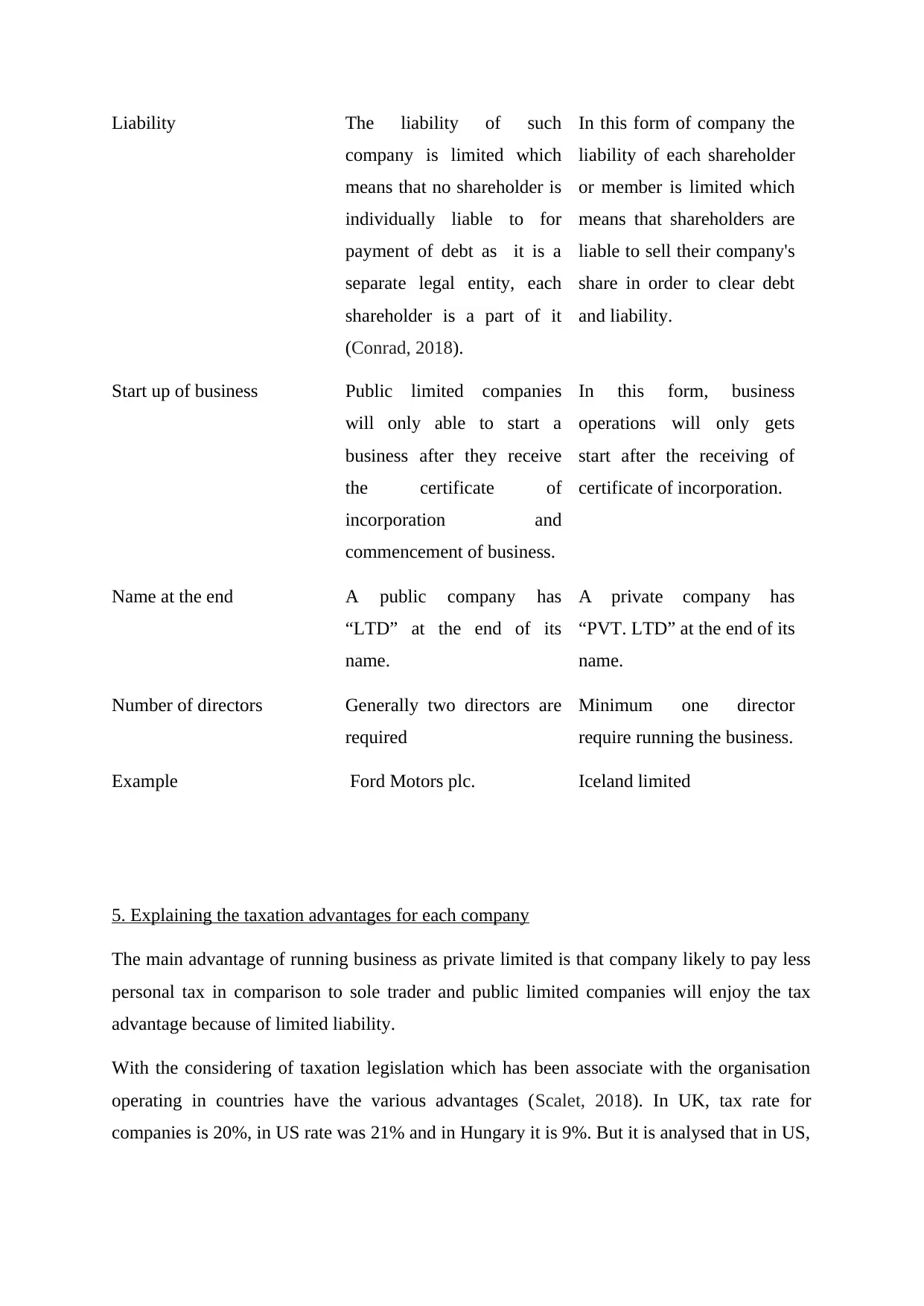
Liability The liability of such
company is limited which
means that no shareholder is
individually liable to for
payment of debt as it is a
separate legal entity, each
shareholder is a part of it
(Conrad, 2018).
In this form of company the
liability of each shareholder
or member is limited which
means that shareholders are
liable to sell their company's
share in order to clear debt
and liability.
Start up of business Public limited companies
will only able to start a
business after they receive
the certificate of
incorporation and
commencement of business.
In this form, business
operations will only gets
start after the receiving of
certificate of incorporation.
Name at the end A public company has
“LTD” at the end of its
name.
A private company has
“PVT. LTD” at the end of its
name.
Number of directors Generally two directors are
required
Minimum one director
require running the business.
Example Ford Motors plc. Iceland limited
5. Explaining the taxation advantages for each company
The main advantage of running business as private limited is that company likely to pay less
personal tax in comparison to sole trader and public limited companies will enjoy the tax
advantage because of limited liability.
With the considering of taxation legislation which has been associate with the organisation
operating in countries have the various advantages (Scalet, 2018). In UK, tax rate for
companies is 20%, in US rate was 21% and in Hungary it is 9%. But it is analysed that in US,
company is limited which
means that no shareholder is
individually liable to for
payment of debt as it is a
separate legal entity, each
shareholder is a part of it
(Conrad, 2018).
In this form of company the
liability of each shareholder
or member is limited which
means that shareholders are
liable to sell their company's
share in order to clear debt
and liability.
Start up of business Public limited companies
will only able to start a
business after they receive
the certificate of
incorporation and
commencement of business.
In this form, business
operations will only gets
start after the receiving of
certificate of incorporation.
Name at the end A public company has
“LTD” at the end of its
name.
A private company has
“PVT. LTD” at the end of its
name.
Number of directors Generally two directors are
required
Minimum one director
require running the business.
Example Ford Motors plc. Iceland limited
5. Explaining the taxation advantages for each company
The main advantage of running business as private limited is that company likely to pay less
personal tax in comparison to sole trader and public limited companies will enjoy the tax
advantage because of limited liability.
With the considering of taxation legislation which has been associate with the organisation
operating in countries have the various advantages (Scalet, 2018). In UK, tax rate for
companies is 20%, in US rate was 21% and in Hungary it is 9%. But it is analysed that in US,
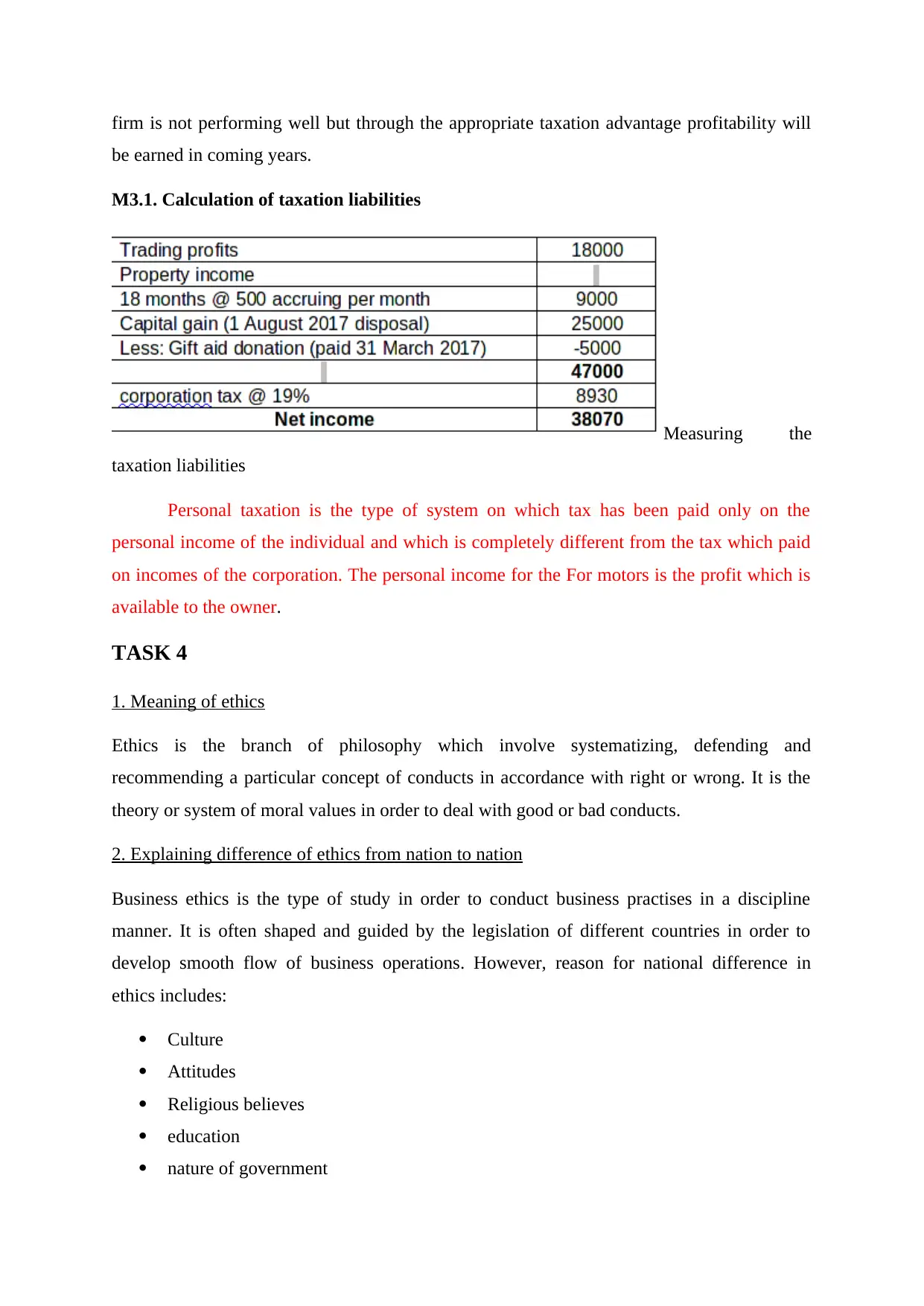
firm is not performing well but through the appropriate taxation advantage profitability will
be earned in coming years.
M3.1. Calculation of taxation liabilities
Measuring the
taxation liabilities
Personal taxation is the type of system on which tax has been paid only on the
personal income of the individual and which is completely different from the tax which paid
on incomes of the corporation. The personal income for the For motors is the profit which is
available to the owner.
TASK 4
1. Meaning of ethics
Ethics is the branch of philosophy which involve systematizing, defending and
recommending a particular concept of conducts in accordance with right or wrong. It is the
theory or system of moral values in order to deal with good or bad conducts.
2. Explaining difference of ethics from nation to nation
Business ethics is the type of study in order to conduct business practises in a discipline
manner. It is often shaped and guided by the legislation of different countries in order to
develop smooth flow of business operations. However, reason for national difference in
ethics includes:
Culture
Attitudes
Religious believes
education
nature of government
be earned in coming years.
M3.1. Calculation of taxation liabilities
Measuring the
taxation liabilities
Personal taxation is the type of system on which tax has been paid only on the
personal income of the individual and which is completely different from the tax which paid
on incomes of the corporation. The personal income for the For motors is the profit which is
available to the owner.
TASK 4
1. Meaning of ethics
Ethics is the branch of philosophy which involve systematizing, defending and
recommending a particular concept of conducts in accordance with right or wrong. It is the
theory or system of moral values in order to deal with good or bad conducts.
2. Explaining difference of ethics from nation to nation
Business ethics is the type of study in order to conduct business practises in a discipline
manner. It is often shaped and guided by the legislation of different countries in order to
develop smooth flow of business operations. However, reason for national difference in
ethics includes:
Culture
Attitudes
Religious believes
education
nature of government
⊘ This is a preview!⊘
Do you want full access?
Subscribe today to unlock all pages.

Trusted by 1+ million students worldwide
1 out of 16
Related Documents
Your All-in-One AI-Powered Toolkit for Academic Success.
+13062052269
info@desklib.com
Available 24*7 on WhatsApp / Email
![[object Object]](/_next/static/media/star-bottom.7253800d.svg)
Unlock your academic potential
Copyright © 2020–2026 A2Z Services. All Rights Reserved. Developed and managed by ZUCOL.





